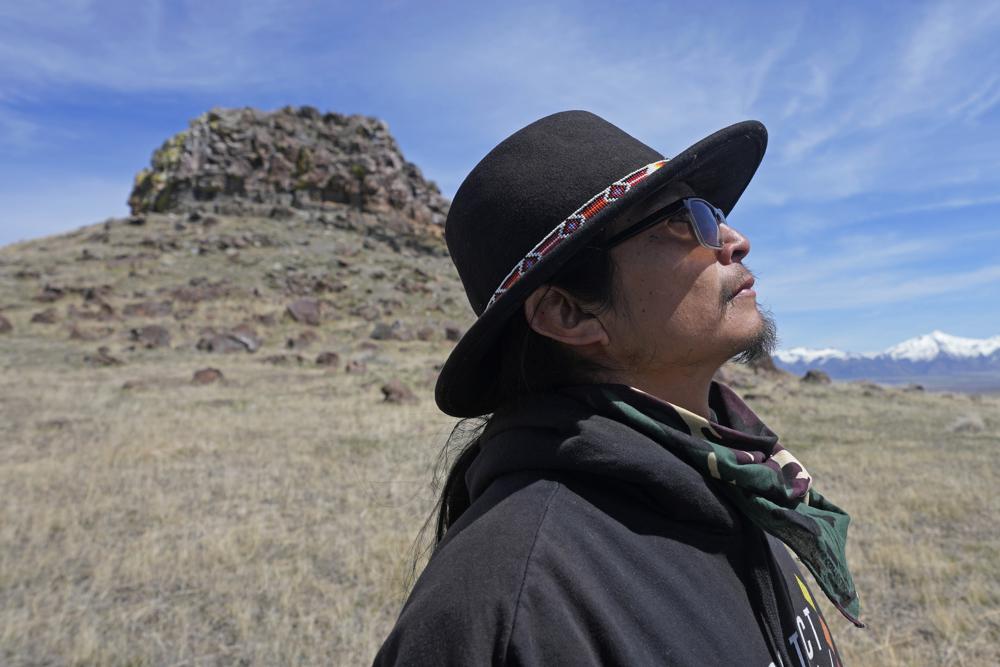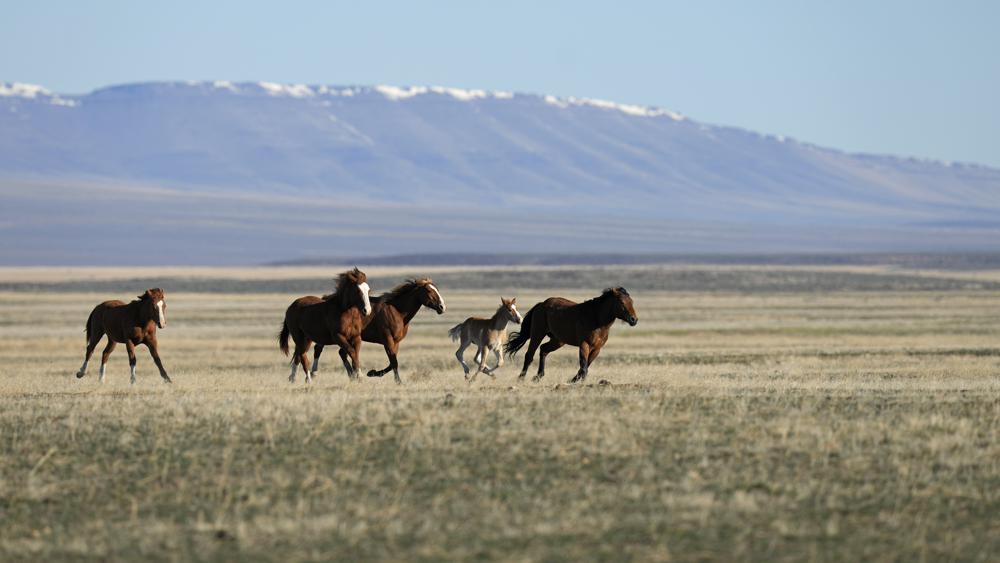The construction of one of the world’s largest lithium mines just 45 miles away from the Fort McDermitt Indian Reservation in Nevada is generating controversy. While the $2.2 billion project is seen as a critical component of President Joe Biden’s clean energy plan, it is also facing significant opposition.
As trucks and heavy machinery excavate the earth to extract lithium for electric-vehicle batteries, protesters are making their voices heard.
Hand-painted signs reading “No Lithium, No Mine!” can be seen in the front yards of residents like Daranda Hinkey, who fear that the mine will have negative impacts on the local environment and communities.
While the Biden administration maintains that the project is essential for mitigating climate change and accelerating the shift away from fossil fuels, opponents argue that it is not worth the costs to the environment and nearby communities.
The controversy highlights the challenges of balancing the push for clean energy with concerns about sustainable development and environmental justice.

Communities around the world are increasingly opposing renewable energy projects that are seen as threatening wildlife, groundwater, and air quality. The dispute over the Thacker Pass mine in Nevada, which is key to President Biden’s push for clean energy, exemplifies these tensions.
Daranda Hinkey, a member of the Fort McDermitt Paiute and Shoshone Tribe and leader of the People of Red Mountain group, is one of the opponents of the mine.
The group argues that the mine would not only have significant environmental impacts but would also desecrate a site where the U.S. Cavalry massacred their ancestors after the Civil War.
Hinkey characterizes the push for renewable energy and the accompanying lithium mines as “green colonialism” that threatens not just the environment but also her people’s culture, religion, and tradition. These conflicts underscore the importance of finding solutions that prioritize both sustainable development and the preservation of cultural and environmental heritage.

Lithium mine draws opposition
The mine, proposed by Lithium Nevada Corp., would span 17,300 acres in the Thacker Pass area and is estimated to contain enough lithium to produce batteries for more than 400,000 electric vehicles annually. The company has received preliminary approval from the Bureau of Land Management to move forward with the project.
However, environmental groups including the Center for Biological Diversity and Western Watersheds Project have filed a lawsuit against the Bureau of Land Management, arguing that the agency did not fully consider the potential environmental impacts of the mine, including habitat destruction for a variety of species and increased water usage.
Tribal groups, including the Paiute and Pit River tribes, have also voiced concerns about the potential for the mine to harm cultural and sacred sites in the area. The tribes have launched a campaign called Protect Thacker Pass, and have held protests and filed a petition with the Bureau of Land Management demanding a cultural resource survey of the area.
Lithium Nevada Corp. has said that it takes environmental concerns seriously and has committed to rigorous measures to minimize the mine’s impact, including water conservation, reclamation of disturbed land, and use of renewable energy. The company also claims that the mine would create jobs and boost economic development in the region.

The future of the project remains uncertain, as legal challenges and opposition from tribal groups continue. The outcome could have implications for the future of lithium mining in the United States, as demand for the mineral grows with the rise of electric vehicles and renewable energy.
The proposed lithium mine in Thacker Pass, northern Nevada has been met with ongoing protests and legal challenges for more than two years.
A federal court is set to hear an appeal against the project this month. Despite opposition from environmental groups and tribal communities concerned about cultural sites and pollution, Interior Secretary Deb Haaland has voiced support for the mine, citing the need for a clean energy economy.
The approval of the Thacker Pass lithium mine project under the Trump administration raised concerns among opponents, but the project remains central to Biden’s goal of making half of all new US cars sold electric by 2030.

Haaland acknowledged her agency inherited the project, but emphasized the importance of ensuring that it is conducted in accordance with science and law. For Hinkey, who has been leading protests against the mine, her activism is a continuation of her leadership experiences, including guiding her college basketball team to a successful season.
According to Hinkey, corporations are frightened by educated Native Americans. Hinkey aspires to become a teacher and believes her athletic background, education, and tribal heritage make her an ideal candidate to confront these corporations.
Hinkey believes that her education and Native American background make her a formidable opponent for corporations, who are afraid of an educated Native American. She plans to become a teacher and believes that her athletic experience, educational background, and tribal heritage will make her an ideal advocate against corporations.

Fort McDermitt Tribal Chairman Arlo Crutcher expressed hope that the lithium mine could provide economic benefits for his tribe. However, he is skeptical about how many jobs will go to impoverished tribe members. Lithium Americas, the company developing the project, has signed an agreement with the Fort McDermitt tribe to ensure local hiring, job training, and other benefits. The agreement includes building a community center with a preschool and playground for the reservation, where nearly half of the population is living in poverty.
Crutcher is optimistic about the economic benefits that the lithium mine could bring to his tribe. However, he is concerned that the number of jobs offered to impoverished tribe members might be limited.
To address this, Lithium Americas has signed an agreement with the Fort McDermitt tribe to facilitate local hiring, job training, and other perks. The agreement also includes the construction of a community center with a preschool and playground for the reservation, which has nearly half of its population living in poverty.
Historic preservation officer Michon Eben of the Reno-Sparks Indian Colony argued that the Bureau of Land Management did not adequately consult with tribes about the Thacker Pass lithium mine project.

Eben observed that the BLM had only reached out to three tribes and bands in Nevada, even though there are 28 federally recognized ones in the state that all have relationships.
Gary McKinney, a member of the Duck Valley Shoshone-Paiute Tribe and a spokesman for People of Red Mountain, similarly claimed that “nobody knew about the lithium.” He criticized the BLM’s claim that taping a notice on a door constituted adequate notice.
Despite these criticisms, Stone-Manning said that she could not control how people feel and expressed regret if people felt the BLM had not adequately consulted with them.
McKinney and others have expressed concern that the lithium mine could cause serious environmental damage, including contaminating groundwater and soil with heavy metals and threatening the nesting grounds of the sage grouse, which are declining in number. The project could also harm sacred sites and put tribal identity at risk.
Opponents of the Thacker Pass lithium mine have raised concerns that the BLM office in Nevada failed to assess the project’s potential impact on the site of a massacre near Sentinel Rock. The rock stands above the sagebrush and high grass used by grazing cattle herds. Historic preservation officer Michon Eben joined the critics, raising the question of what might happen to those who were massacred and buried at the site in an interview at Sentinel Rock.

The exact location of the massacre, which involved the killing of at least 31 Paiute men, women, and children by federal soldiers, is unknown. However, it is believed to have occurred within a few miles of the Thacker Pass mine. Tribes refer to the site as Peehee Mu’huh, which translates to “Rotten Moon” in the Paiute language.
Although a federal judge allowed construction to begin at the site in February, they also ruled that the BLM had violated federal law regarding the disposal of mine waste. Conservationists have since appealed, and the 9th Circuit U.S. Court of Appeals, based in San Francisco, has scheduled oral arguments for June 26th.
Eben expressed her trust in Interior Secretary Deb Haaland, who is a member of New Mexico’s Laguna Pueblo. Eben urges Haaland to come and “walk this land” with them and listen to their oral histories. She emphasized that a massacre did occur in the area, and their people were killed. Moreover, Eben said that mining cannot solve the climate crisis.
